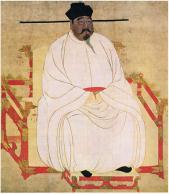 | There is an old Chinese saying, “The times produce their heroes.” Zhao Kuangyin joined the army of the Later Zhou Dynasty and was promoted to be commander of the imperial guards because of his outstanding battle achievements. In A.D. 960, Zhao Kuangyin, commander of the Later Zhou's imperial army, suddenly launched a mutiny at Chenqiao near Kaifeng (today’s Henan Province). His troops stormed into the city of Kaifeng. Then Zhao Kuangyin ascended the throne, established the Song Dynasty and became the first emperor of the Northern Song Dynasty. |
After that, Zhao Kuangyin launched a series of wars and managed to unify the separatist regimes in South China in thirteen years. Later, Zhao Guangyi, the younger brother of Zhao Kuangyin, the Emperor of Taizong conquered the Northern Han Dynasty, ending the separated situation for the previous 50 years and reunifying China once again.
Zhao Kuangyin was also an emperor good at dealing with state affairs. He conducted a variety of iron-handed reforms with his grand verve. He promoted agricultural production and mulberry planting, and established a series of preferential policies for agriculture so as to promote the development of social economy. He strengthened centralization, took over local military power, and appointed civilians to be local officials. He rectified the official administration, enacted severe laws, and punished a great batch of corrupted officials so that the chaotic society became ordered and ran on the track of sound progress. He paid attention to talent training, optimized the imperial examination system, set up schools, respected knowledge, and revitalized Confucianism. He attached great importance to develop cultural causes, and organized scholars to compile important classics such as “Taiping Imperial Encyclopedia”, “The Cream of Literary World”, and “Cefu Yuangui”, etc so that the publishing industry entered an unprecedentedly prosperous age in the Song Dynasty. Zhao Kuangyin, a master of both the pen and the sword, was equipped with great talent and bold vision. He not only restored the trauma of decades of wars during the Five Dynasties and Ten States Period, but also established a solid foundation for the reign of the Song Dynasty for over three centuries. |